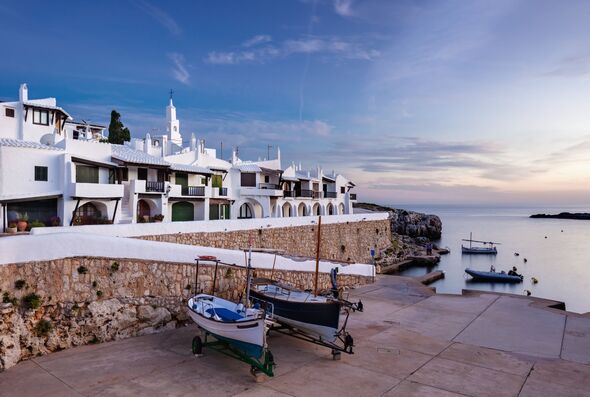A tiny Spanish seaside village has slapped a tourist ban on a pretty area as they fume about not benefitting from its popularity.
Binibeca Vell is one of the busiest places in the south of Balearic island Menorca thanks to its gorgeous white houses that are reminiscent of Greece’s Mykonos.
But every year more than 800,000 tourists flock to the area which is causing overcrowding and fury from its fed up residents.
On Wednesday, May 1 public access was restricted for much of the day in a desperate effort to crack down on the visitor numbers.
Now the owners of the 195 houses have decided to keep access to the village open only between 11am and 8pm.
Óscar Monge, the president of a group of house owners, wants to propose at the general meeting on August 10 a total ban of visits to his complex.
The Council of Menorca and Sant Lluís Town Council provide just over €25,000 a year (£21,524) to help the owners paint, clean and maintain the properties.
Mr Monge said: “We have been a private urbanisation for 52 years, but it is becoming increasingly difficult for us to enjoy a quiet holiday, as we pay dearly for being the most popular tourist attraction in Menorca,” reports Majorca Daily Bulletin.
He added: “Binibeca is promoted by the administration and tourism companies, but what benefit do we get out of it?”
Monge said the homes are plummeting in value as a result of the chaos.
Susana Mora, PSOE secretary general (The Socialist Federation of Menorca) and island councillor, stressed the “important” public and social repercussions for the island as “these private houses are an important attraction at a European level, which also benefits the tour operators and the restaurants and businesses in the area.”
Meanwhile the neighbouring Majorca has announced plans to monitor British mobile phones this summer.
The surveillance tactic is part of a new strategy to combat overtourism, amid growing anger from locals on the largest Balearic Island.
Opposition parties have criticised the plans, which will use the number of phones to measure beach overcrowding.
And from January 1, 2025, Tenerife plans to impose a new charge, which has been described as an eco-tax on tourists visiting its most popular attractions.
This decision is part of the island’s new tourism strategy, which was developed in response to significant protests across the Canary Islands on April 20.
